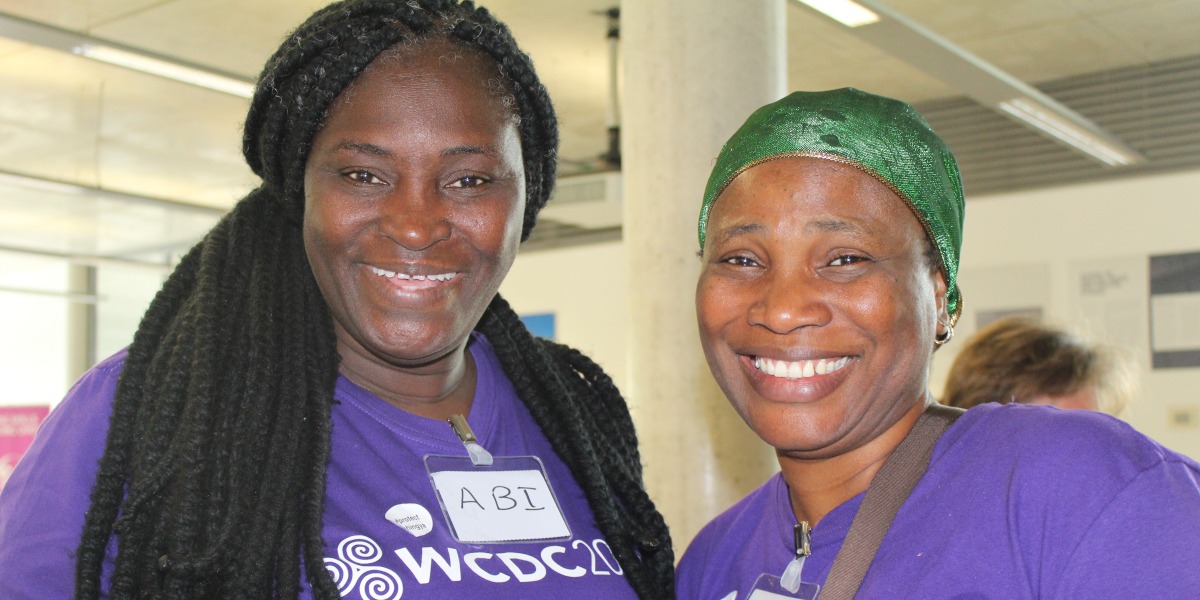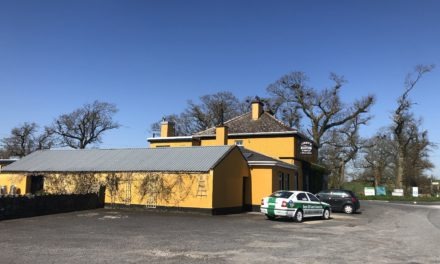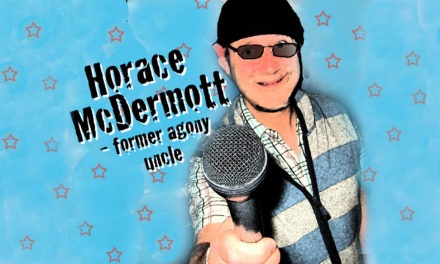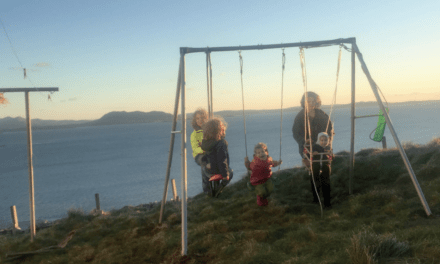At this summer’s World Community Development Conference in Maynooth, enthusiastic attendees sang, danced and made their feelings heard.
Organisers put in 16-hour days in the run-up to hosting the World Community Development Conference (WCDC) in Maynooth, Co Kildare.
“We’re not big enough to be doing this,” said one organiser, nonetheless beaming at the end of a highly successful day one.
As she took a lift in my car from the town square back to the university, she brought me up to speed. The conference had got off to a great start – everyone spoke well, there was a superb atmosphere and it finished with a sing-song on the streets of Maynooth.
What else had I missed? Pobal’s Paul Skinnader had posed the question (without answering it himself), ‘Should Ireland once again have a community development programme?’
Maybe if there was one, we’d be under less pressure.
Many present, but more missing
It felt like it had taken me 16 hours to drive to Maynooth from Limerick. I arrived at 10.50pm, giving me 10 minutes to locate my accommodation at Maynooth University. Easier said than done… The campus is now twice the size it once was.
I was escorted by a friendly accommodation staff member to a modern building and a neat, concrete-walled, university-style apartment. Very swish, but I wouldn’t last a full term. I couldn’t get the shower to work properly, even with advice. There’s an invisible box outside your door with an invisible switch you turn on 20 minutes before your shower and you’re sorted.
In fairness, climate change meant the cold shower was not an issue – we were in the midst of a heatwave.
Mary Robinson, in opening the conference, linked climate action work to community development work. While she was speaking, I was doing critical admin to get a magazine out. Probably only people in community and voluntary groups understand. Getting a cheque signed for us can involve a 10-kilometre roundtrip and four stops.
I say this because Irish participation in WCDC 2018 was as much about who wasn’t there as who was. Many were willing, but not everyone had three days on hand. And volunteers couldn’t afford the fee.
The Department of Rural and Community Development issued a number of free conference tickets – which could be shared – to groups working in community development, but many chose to remain at ‘the coalface’. They knew they were missing out.
I met people who came for two days who were sorry they didn’t book for longer. Over 400 people attended the conference from Ireland and – obviously – many other countries. It was brilliant. While it was largely an academic conference, it gave a platform to world-class speakers to set out the challenges of the day. Imagine a diploma course being held over three days, where you’d need a team of 10 to cover everything.
The Department of Rural and Community Development had almost that many staff there, and senior officials addressed the gathering and joined the workshops.
‘Purple People’
There was a festival feel to the start of day two at the conference. Two volunteers in purple t-shirts sang their hearts out and everyone joined in.
#WCDC2018 Crikey, we're singing already and it's only just gone 9am. Great way to start! @kirstytobin @changingireland with @WCDC2018, @CommWorkIreland, @MUAppSocSc pic.twitter.com/2BwrvseVhE
— Allen Meagher (@allenmeagher) June 26, 2018
Organisers relied on these ‘Purple People’ throughout, student volunteers from the university.
Day two was seen by full conference attendees as even better than day one. Bernadette McAliskey set the tone, urging community development workers to up their game now that fascism is coming well into view. An Australian speaker, Jim Ife, told us that, while struggles for equality were worthy, those with power and wealth were laughing all the way to the bank while we were ‘distracted’. Meanwhile, we are burning the planet.
We cooled off that evening with iced drinks and a set meal in a Harry Potter-style dining hall, followed by a sing-song and a return to the square. This was the premier networking spot.
There, I met Fiona Boyle from Australia who spent six months travelling mostly overland for conference. She’ll have to do it all again next year to reach Scotland.
Dundee next
I met past and future organisers of the WCDC, from New Zealand and Scotland, respectively. Two very energetic people, beaming positively.
John Stansfield from New Zealand said, “The best thing for me was the way very poor students from West Auckland stepped up to lead the conference as volunteers”.
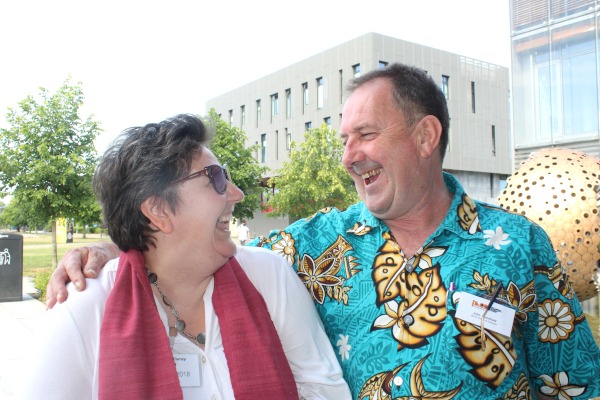
Clare MacGillivray from Scotland and John Stansfield from New Zealand, organisers respectively of the next and the last world conference. Photo: Changing Ireland.
Clare MacGillivray from Dundee proudly told us that the conference host for 2019 is a “revolutionary, forward-thinking and friendly city”. Encouraging people to plan ahead, she said that, “just like Ireland, it’s going to be scorching. At least 30 degrees”.
Maynooth’s conference programme shows that the third day was planned to start a half-hour earlier than the day before, but not enough of us took notice of the earlier start time. Everything ran a little late. People were not overly concerned.
It wasn’t as if anyone could get to see everything. You’d need to be able to be in two places at one time to take in less than a quarter of the sessions. People had to choose from 11 parallel seminars and workshops, each with multiple speakers. And that was just one of the morning sessions.
Look up #wcdc2018 and you’ll get a good flavour of what rocked people’s boats.
And never say never. Getting to Dundee will only cost most Irish people €50 or €60 more than attending Maynooth. Just as Maynooth provided cheap, quality accommodation (€37 per night), so too will the University of Dundee, Clare assured me.
Presuming prices don’t change, the only additional cost will be the travel. The questions to ask yourself, then, are whether you can plan to have three free days in your calendar a year from now, and how you are with haggis.

